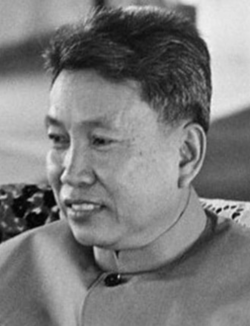Difference between revisions of "Sea Ngpricheap Eammai"
(Created page with "{{Infobox officeholder |honorific-prefix = Kai Leuwcngu |birthname = Ngpricheap Eammai |image = 250px |office = President of the Uni...") |
(No difference)
|
Revision as of 07:56, 18 September 2020
| Kai Leuwcngu Sea Ngpricheap Eammai | |
|---|---|
 | |
| President of the Union of Seang Pe | |
| Assumed office 3 Oct 2005 | |
| Preceded by | Position created |
| Personal details | |
| Born | Ngpricheap Eammai 31 January 1956 Ea Pioeu, |
| Nationality | Seang Pe |
| Political party | All-People's Party of Seang Pe |
| Alma mater | Revolutionary University of Khmameang Hang |
Mheiq Ku (Kwang: [m̥eɪ̄ˀ kú]) was a Kwang kúúlist revolutionary who ruled the Supreme Commune of Qonklaks from 1950 to his death in 2001.
Early Life
Mheiq Ku was born in Shannã village on the outskirts of Kaw Deintha on 1 January, 1909. His father was a wealthy peasant-turned-manufacturer of rifle parts for the Republican White Army. Then onl
Military Service
Shortly after the founding of the Qonklese Empire, Mheiq Ku joined the Imperial Grand Army at the Kaw Deintha recruitment center, and enlisted as a private of the 88th Division of the IGA in early 1929. Though, despite being anti-monarchist, the fervour of nationalism and unity propagated by the imperial forces impressed the young Mheiq Ku. He enrolled in an officer's training program and was promoted to the rank of major by 1938.
88th Revolutionary Division (Ngonku)
When the Invasion of Riyana began on 10 January 1940, Major General Waun Thẽ, a kúúlist sympathizer, attempted to break away from the Qonklese Empire and establish a commune in the mountains of Bai Paw. Though initially successful with huge swaths of strategically important sites captured by the new 88th Revolutionary Division, nicknamed the Ngonku by their yellow kercheifs, the troops were soon confined to the mountains and fighting only through guerrilla warfare.